Writing for the Ear, not the Eye
Annoucement! I’m doing a quiz on my book, ‘Story Rules’ for all those who have read it! It’s on 29-November from 11 am to 12 pm. Click on the image below to register!
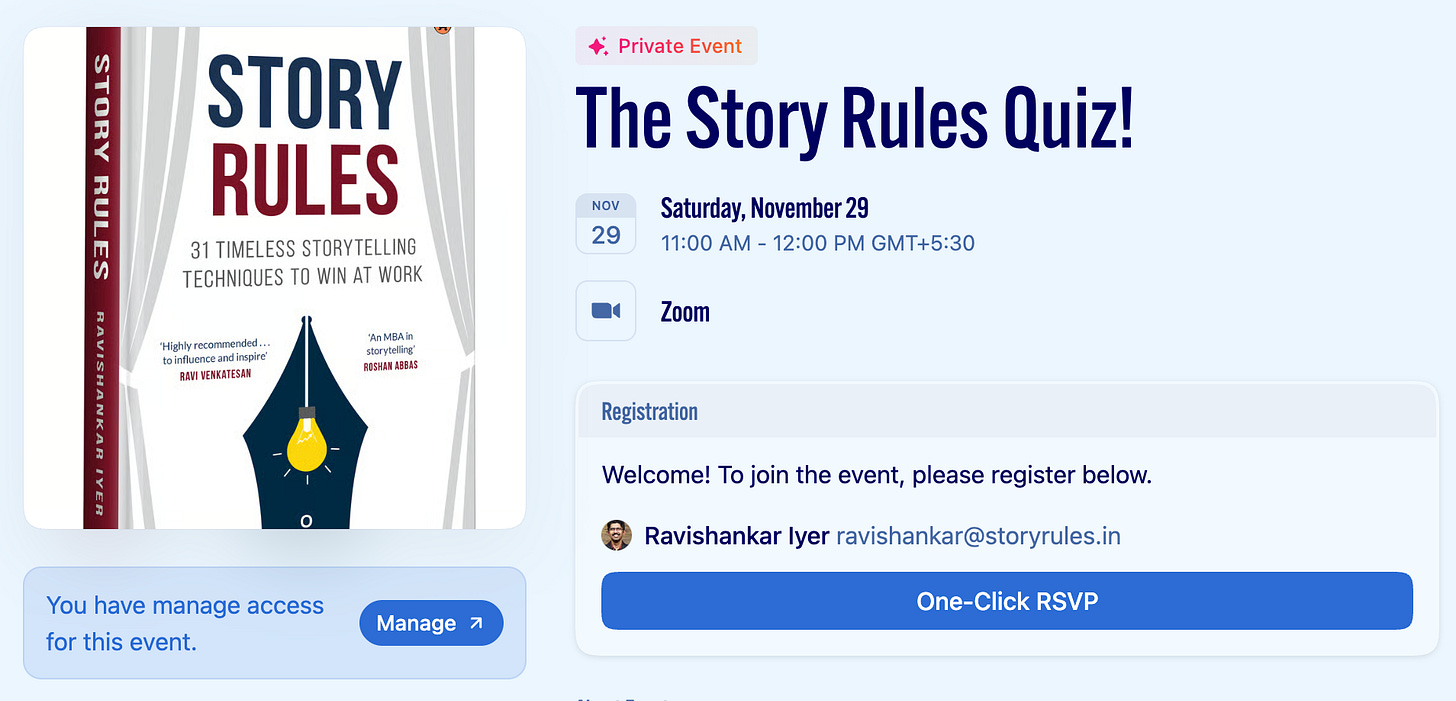
The quiz would be conducted by Sanat Pai Raikar (founder of Quizairre). 🙂
Apart from questions on the book (and storytelling in general), I would also share some behind-the-scenes trivia about the writing and editing.
Please do register before-hand—I look forward to seeing you!
—
Btw, this was one of those busy weeks—I was in full-day sessions Monday to Thursday and then had a 45-min keynote at a conference on Friday!
One cool part of the travel was visiting multiple bookstores at Church Street, Bangalore, for some book signings!
And now, on to the newsletter.
Thanks for reading The Story Rules Newsletter! Subscribe for free to receive new posts and support my work.
Welcome to the one hundred and forty-second edition of ‘3-2-1 by Story Rules‘.
A newsletter recommending good examples of storytelling across:
- 3 tweets
- 2 articles, and
- 1 long-form content piece
Let’s dive in.
𝕏 3 Tweets of the week
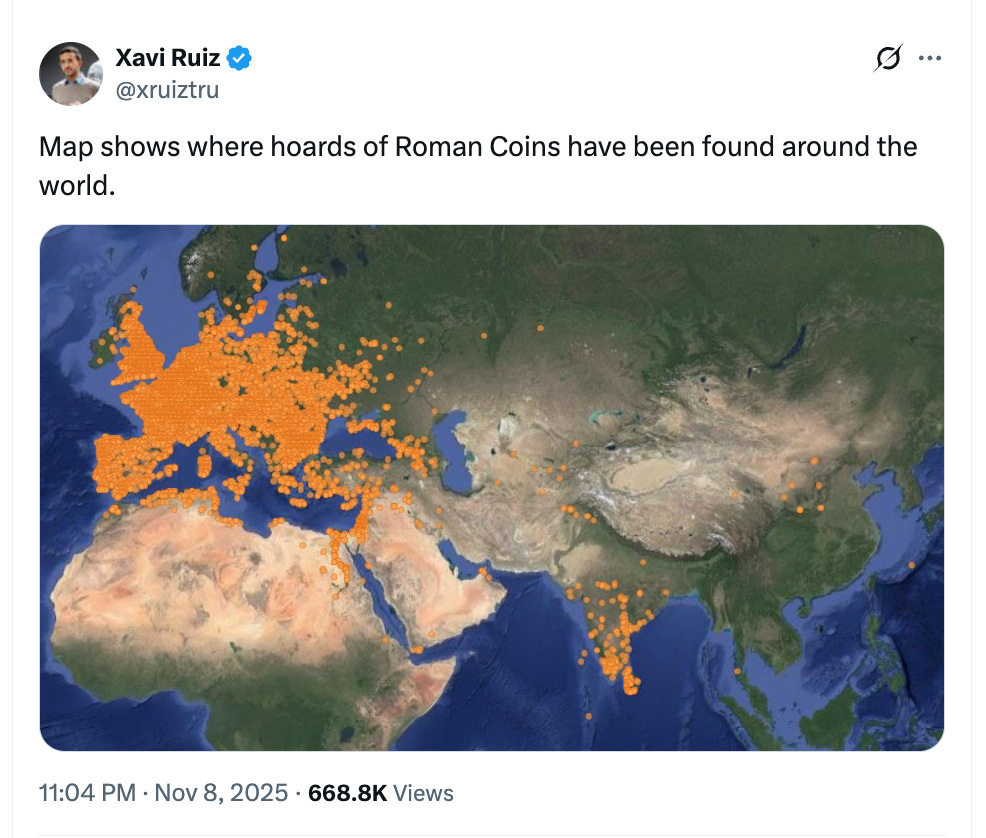
Fascinating. Folks from South India had been turning black pepper to gold for centuries!
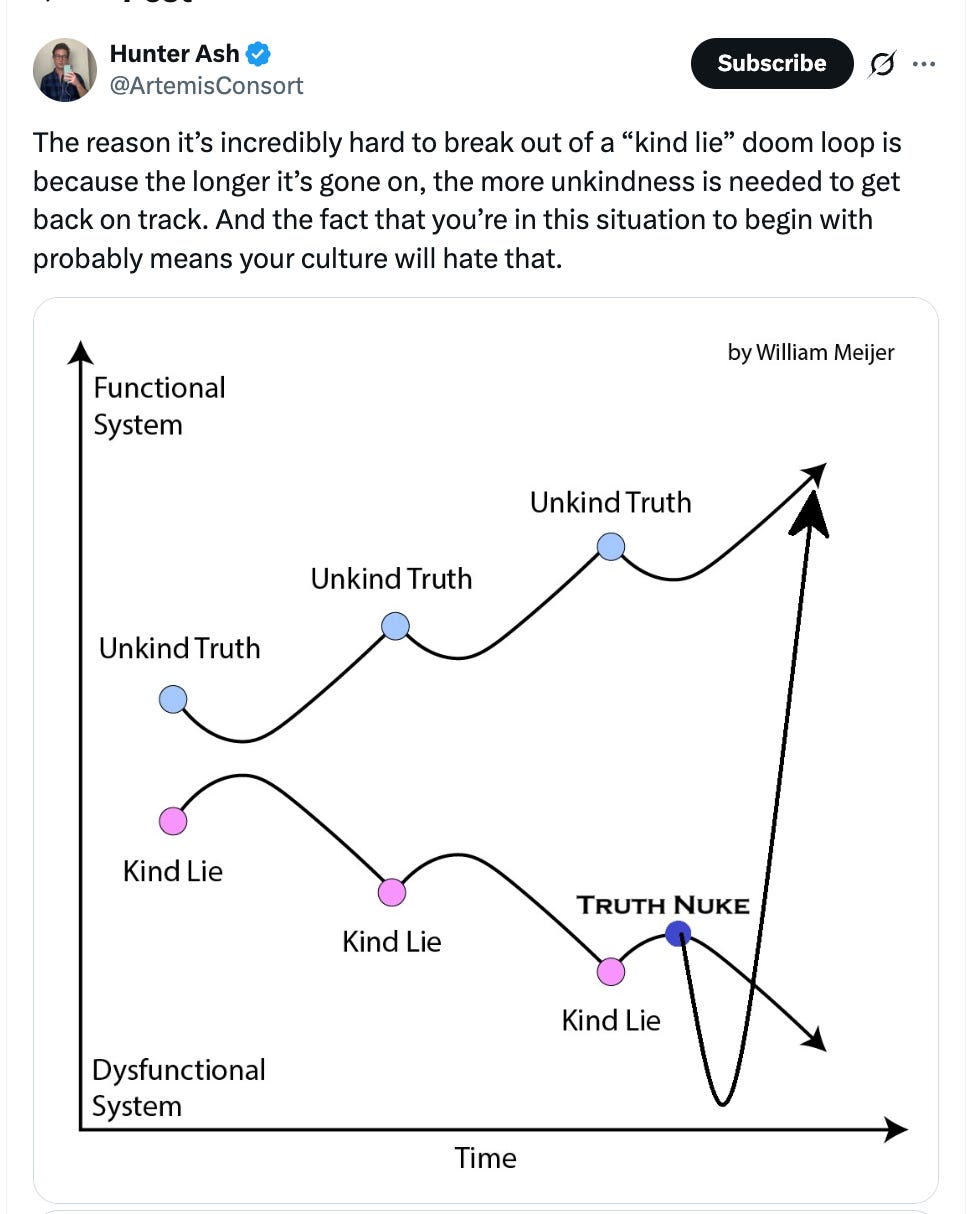
That’s a powerful chart to make the case for candour in work and relationships!
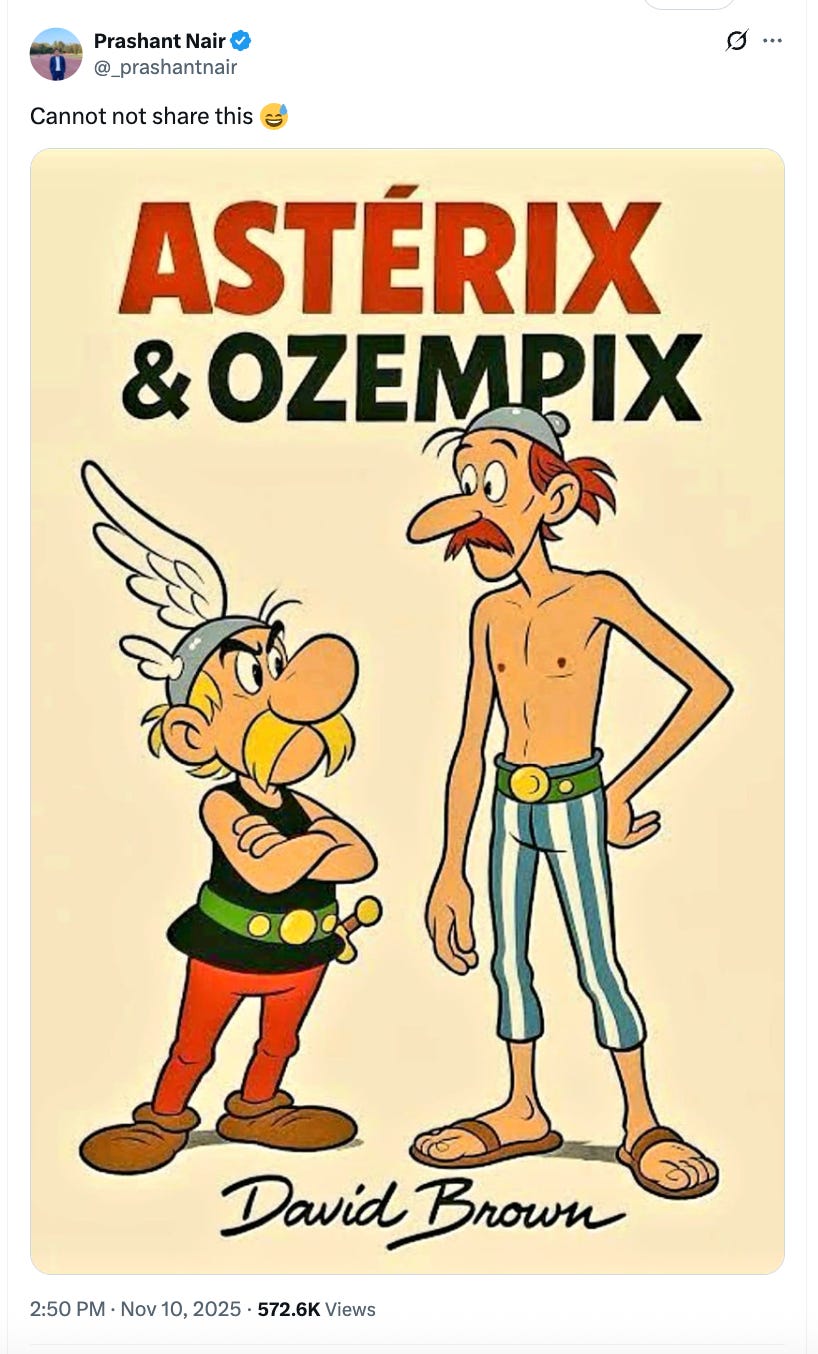
Hahaha, that’s hilarious!
📄 2 Articles of the week
a. A superb hiring story for a summer intern at Ramp
This one is really a longish tweet, but I absolutely loved the way in which it frames the work being done by Ramp (a spend management platform).
Would you put so much effort for hiring a summer intern? 🙂
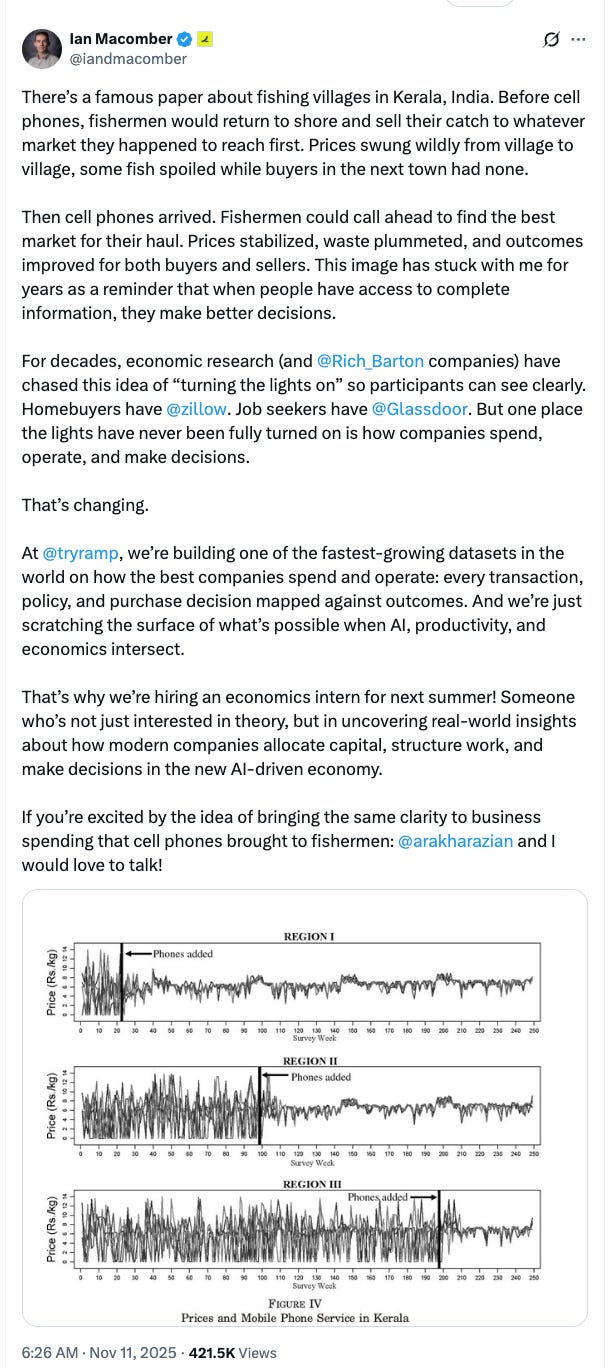
b. ‘What the UK newspapers missed about Aadhar’ by Charles Assisi
Hat/tip: Manish Jain
Assisi writes about why India should not use western norms for privacy and data-ownership for countries like India. I loved the use of contrast here:
In the West, privacy means it’s the right to be left alone. So much so that Europe has turned it into regulation. You own your data. The state or a company touches it only with consent. As opposed to that, in India, people have spent decades trying to become visible to the state. For millions of people, the fear wasn’t that the government knew too much, rather it was that the state did not know of their existence.
He uses a simple analogy for Aadhar, as an email id:
… how are we to think of Aadhaar? Metaphorically, imagine it to be an email address, not a password. While you may know the address, the biometrics is the password. Without that second layer, the number is just noise. Confusing an identifier with a key is like mistaking a phone directory for a break-in.
A simple yet powerful conclusion:
The UK’s digital-ID debate is stuck in a loop of Cold War fears — the government as Big Brother. India’s problem was the opposite — a government that didn’t know who its citizens were. Two democracies, two anxieties, two definitions of privacy. That’s the paradox at the heart of modern democracy. While the right to be left alone matters, the right not to be left out matters just as much.
🎧 1 long-form listen of the week
a. ‘What It’s Like To Be… A Speechwriter’ by Dan Heath
I love this podcast by Dan Heath (one of the authors of ‘Made to Stick’) where he speaks to people from different professions and finds out what’s it like to do their job.
Heath has spoken to folks like: an ice-cream truck driver, a CIA agent, a PR leader and a CFO.
This one is with Stephen Krupin, a professional speechwriter, who also wrote speeches for Barack Obama.
I loved this story that Heath shares about Krupin being hired to write a commencement speech and facing an unusual roadblock:
Heath: Stephen told me about a time he was hired by a professional athlete who was coming to give the commencement speech at his alma mater… this athlete had set a record in his sport at the collegiate level. And that was one of the reasons he was a favorite son of this university, one of the reasons he was asked back to give the commencement address in a certain year.
Krupin: And as a speechwriter, part of my job is to extract the details that would make the speech interesting. I asked him about that moment when he set that record in his sport, something the university was proud of. And he answered that question by saying, I have no recollection of that moment.
In a moment of sheer inspiration (and writing genius)—Krupin turned the lack of recollection into a key framing device:
And then I realized that revelation could shape the entire speech because it turned into an exploration of what are accomplishments? What is the difference between the pursuit of that accomplishment and achieving that accomplishment? And that seemed to me a nice narrative framing device that could shape the rest of the speech as a lesson to the graduates of, “You’ve just accomplished this big thing, graduating. You’re going on to accomplish other great things and follow other passions as the cliche says. But how do you embrace that experience and pursue that adventure?”
Krupin also had to write Obama’s annual speech at Arlington Cemetery—it would be his eighth one, in the last year of his Presidency. To make it different, he focused on stories of recently fallen soldiers:
I had the privilege of writing President Obama’s final memorial day address that he delivered at Arlington Cemetery. And one of the challenges of this speech is that the president speaks every year, usually at Arlington Cemetery. And so how do I write the eighth of eight speeches when everything has been said before? And the approach that we picked was to tell the story of three service members who had been killed in combat since the previous Memorial Day. And part of that process required calling the families of these fallen and asking as politely and unobtrusively as we could to tell us something about those who they’ve lost.
Writing for the ear is different:
… this is a first commandment of speech writing, is that writing for the ear is a fundamentally different dialect than writing for the eye. And that’s because our eyes and our ears have different memories and absorb information differently. It’s why you wouldn’t just read out a white paper or an op-ed and call that a speech. And so what we think about is the cadence and the rhythm of the words as much as we think about the argument that we’re building or the stories that we’re telling or the calls to action that we’re issuing.
Reading off prepared remarks is not a bad thing—it’s a sign of respect to the audience:
I think there is increasingly a sense that reading off of prepared remarks or a teleprompter is some kind of deficiency or crutch. And you’ll often hear speakers say, I had something prepared, but I’m gonna throw it out and I just wanna speak from the heart. And I get what they’re trying to do there. But I think reading off prepared remarks is a sign of respect to the audience, that you took enough time to think about what they needed to hear and what they needed to understand, and to draw a connection between you, the speaker, and them, and whatever the issue is that you’re talking about, and took the time to prepare something.
When giving a rehearsed speech, how do balance between polish and authenticity? I loved this insight—you should rehearse the first and last lines; and the middle part can be natural using bullet points:
There’s a tension, in public speaking, between polish and authenticity. And he’s saying, you want to polish your opening and ending sentences to a given story. So script those. Those are your on-ramps and off-ramps to the story. And for the heart of it, just be natural. Put bullet points in your notes instead of scripted prose. The ultimate goal here is to make a speaker sound authentic and natural, even when they’ve prepared obsessively.
That’s all from this week’s edition.
Photo by Diana Polekhina on Unsplash








